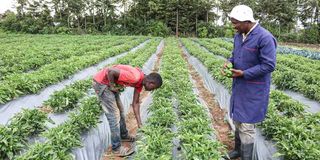Plastic mulching has improved my harvests

Samuel Gachoka Mwaniki (right) and one of his workers harvest capsicum.
Samuel Gachoka Mwaniki started farming in 2008 but battled nematodes for years.
Mwaniki says controlling fungal diseases associated with the pest is not easy.
Nematodes affect plants but diseases associated with the pests are difficult to detect. Typically, crops affected by nematodes do not thrive, turn pale, wilt and eventually die. They are often dwarfs with small leaves.
Until he gave farming a short break in 2018, Mwaniki was growing French beans, tomatoes, onions, cabbage and capsicum on his 20 acres in Joska, Machakos County.
“I relied on River Athi, whose water is not only heavily polluted but scarce. I feared producing crops that would not be fit for human consumption,” says the farmer with a Diploma in Telecommunication Engineering.
Tuta absoluta, a highly destructive pest, also gave Mwaniki endless sleepless nights.
He recalls losing his spinach and tomato harvest valued at Sh400,000 to nematodes.
Mwaniki then took a leave after the heavy financial loss, to plan the way forward. He engaged in research and talked with an Ol Joro Orok-based farmer who was using paper mulch to grow his crops.
Professionally known as plastic mulching, it helps keep crop diseases and pests away.
Mwaniki moved to Naivasha to revive his farming and started practising paper mulching on tomatoes.
In Maraigushu village, about 100 metres from Mau Mau Road, Mwaniki demonstrates that the farming model can transform a semi-arid region into a food basket.
Erratic rain
Rainfall in Naivasha is little and erratic. Because of that, many households grow onions and other crops that require little water.
Mwaniki’s five-acre piece has capsicum, red and white cabbage, onions, spinach and sukuma wiki.
Plastic mulching is practised on an acre that has green pepper and red cabbage.
Mwaniki says the shiny dark-grey polythene paper greatly reduces production costs.
“Apart from helping control pests and diseases, the paper stops the growth of weeds and conserves moisture,” he says.
Samuel Waikwa, a chemical agronomist, says the model is part of conservation agriculture and urges more Kenyan farmers to embrace it.
“It is a viable farming method, especially in dry and semi-arid areas since it reduces evaporation,” Waikwa told Seeds of Gold.
He says farmers in urban centres need to practise paper mulching too.
“Water is a serious challenge to farming. If this technology becomes widespread, Kenya will never suffer food scarcity,” he says.
Apart from capsicum, strawberry and tomato, paper mulching is also used in the production of cabbage, spinach and kales.
Crops grown using the technology mature fast, Maniki says, adding that he starts harvesting capsicum two months after transplanting, instead of three under open soil.
“The technology is not labour-intensive and reduces production costs by up to 80 per cent,” says the 42-year-old politician.
Mwaniki contested the Naivasha East ward Assembly seat as an independent on August 9, 2022.
A seedbed on the farm is 30cm high, 100cm wide and 36 metres long. The beds have manure mixed with lime and topsoil excavated from furrows.
“Mulching paper is then placed on top. Soil is spread on the edges along the paths to prevent it from being blown by the wind,” he says, adding that polythene paper is Sh65 per square metre.
Two drip lines are installed under the paper in every bed 1.5ft apart.
“Mulching holes are made for capsicum seedlings,” says the farmer, adding that the technology can last two years.
He says the method has enabled him to produce vegetables and fruits organically as it has largely reduced the use of chemicals. In addition, his produce is clean.
Whiteflies are the only pests that attack Mwaniki’s crops.
On average, he harvests 500 kilos of capsicum a week, his target markets being Naivasha, Nakuru and Nairobi.
He grows red and white cabbage on two acres, onions on an acre and a half, spinach on an acre and sukuma wiki on half an acre.
Mwaniki has a 290-metre deep borehole. The father of three is also in the transport and construction business.





